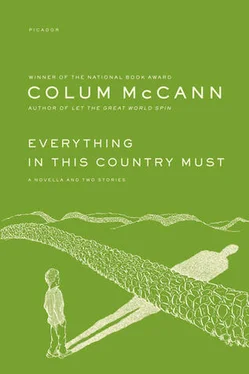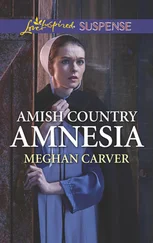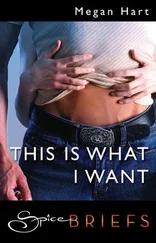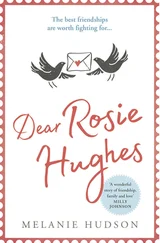The church was new and high-windowed and antiseptic.
When they went for Communion he walked a few steps behind her. For the first time he properly heard the words: This is the body of Christ. He wondered if the hunger strikers who had already died had taken the last rites and, if they had, did they receive bread before they died? He found himself tortured by the question and he had visions of emaciated men walking around the prison hospital with single patches of white on their tongues wondering whether they should swallow or not. The weight of the bread held their tongues down and so they could not ask the question of God. Their eyes watered. Slowly the bread dissolved on their tongues and entered their saliva and the hunger strike was broken. A prison doctor came and gloated. The men sank to their knees and died from starvation anyway.
He felt his mother elbowing him in the ribs and he looked up to see that the Mass had ended.
Outside, the priest was shaking hands with the congregation. The boy waited on a distant stone wall while his mother made her way through the crowd. He noticed that the priest brushed his hand against his mother’s elbow and the boy said aloud: You horny bastard.
They were given a lift to town by a man with a long and sunburned face who asked if they were going to the pony races. His mother said no with a firmness that delighted the boy.
In the newsagent’s they bought the Sunday newspapers and two loaves and four cream eclairs. As they were emerging from the shop, he saw the old couple entering. They looked as if they’d been toiling in their garden.
The old woman winked at him and the man patted him on the head and the boy could feel the delicate weight of the old man’s hand as he walked away from the shop.
That’s my friend, he said to his mother.
Oh, that’s him? He’s not exactly a bed of roses, she said with a chuckle.
What’s that supposed to mean?
I’m just kidding.
What’s it mean?
I’m joking, love.
You smell too. You smell worse than he does, you know that?
Listen, I’m just kidding you, love. Take it easy.
He scowled and found himself trying to sniff at his own armpits as he slouched behind her. He remembered his chess pieces, and as he followed his mother he thought to himself: Fuck the queen, I’m a knight.
In the caravan they spread out the Sunday papers on the table. There were photographs of his uncle from years ago. He ran his fingers over the face, then cut the pictures out very carefully. He put one of them in his shirt pocket and taped the other above his bed. Later, as he played chess with his mother, using the wooden pieces, he patted the photo in his pocket and it seemed as if his fingers were moving over his uncle’s ribs. They felt prominent, like the ribs of a hungry horse. The bones made a sound like some musical instrument, and when he shoved his fingers deeper into the pocket he could feel the water swish in his uncle’s belly.
* * *
IN THE GRAVEYARD after kayaking he found another pint glass at the site of the young man. This one had no lipstick, but it was ribbed with beer stains, perfect circles from where each gulp had been taken. He took the glass home and she inadvertently cleaned it and put flowers in it and placed it on the table, neatly positioned between the salt and pepper shakers, the flowers nodding in the wind every time the door of the caravan opened. After a while he began to like the idea of the glass being used, and he wondered if, by the end of the summer, he would have a little collection. A neighbor in their housing estate had kept rubber bullets, divining their histories from their scars — what wall they smashed into, what car, what warehouse, what flesh. The deeper the scar, the shorter the distance the bullet had flown. It was a simple logic the boy might apply to the residue of rings that were left on the side of the pint glass.

* * *
IN THE CARAVAN MIRROR it seemed to him that he looked older now and he found a single hair on his chest. In the morning he went toward town with a sort of brazenness and his shirt ambitiously undone.
At the end of the pier he blew kisses to the women who wore the skimpiest bikinis. They gestured back and invited him to their bedrooms and they made love endlessly, sometimes two or three of them all at once — they liked the way he talked and they told him he had the biggest willy they’d ever seen. He chuckled and whooped along the beach-front road, hearing them shout that it was massive, absolutely massive, their husbands together couldn’t find a penis that size if they strung them end to end. When the old man came out of his house and asked him what he had been screaming about, the boy blanched and stuttered and said it didn’t really matter, he was just shouting at the fishing boats, and the old man told him that was as good an occupation as any. When he was far enough away from the house the boy began laughing once more and the women called his name from all angles.
* * *
SHE CAUGHT HIM late one evening sitting on the graveyard wall, smoke rings curling up above his head. She checked through her handbag and told him not to steal any more cigarettes. He lied and told her he would quit.
Your daddy never smoked, she said.
They sat on the cliff, under an inkening sky, and the boy was surprised to see her cry although she said it was the wind that disturbed her eyes. She said she remembered a time before she and his father got married. It was the sixties and they would come down from the north to camp for the weekend in an abandoned wooden hut by the seaside not so far from this town. At night in the old hut they would cuddle. She said this with a wink and the boy laughed with her. Cuddle, she said again. Cuddle. His mother was up on her feet now and animated with memory. There were fishermen in that town, she told him, and often the birds came and plucked whatever fish innards were left near the boats. The birds would fly to the roof of the hut and sometimes drop the leftovers there so the roof had begun to sag and rot, and once a beam fell. The air was sweet and hushed during those summers, and when autumn came, leaves blew in on top of them. They stayed in the hut, his mother and father, cuddling.
His father’s face rose up in his mind, long wispy hair going bald, dark eyes, an abrupt nose. He thought he could reach out and touch him.
She was laughing now as she talked and she seemed suddenly very young to him, but after a while he mentioned his uncle and they felt instantly guilty about their laughter.
Tell me about him, he said.
I never really knew him.
Did Daddy like him?
When they were young, yeah. They worked on the farm together. They had good times. They brought in the hay and milked the cows and mended walls when they needed mending. She paused: When they were older they argued.
What about?
Your father never believed that the cure for war was war.
See, said the boy, even you say it’s a war.
She ran a ringlet of hair around her finger: It’s a war, yes, it’s a war, she said sadly.
Then they should get what they want.
They should, yeah, maybe.
It’s simple.
Nothing’s simple, love.
Do you hate him?
Of course I don’t hate him. He’s my brother-in-law.
I know you hate him. I can tell. You hate him. I know.
Ah, love.
He was set up.
Come on now, let’s—
Eighteen years for explosives he never used, the boy said.
That’s maybe not all he did.
It’s all he got charged for. Explosives.
That’s true, but you never know—
I do know. He was set up.
Читать дальше













